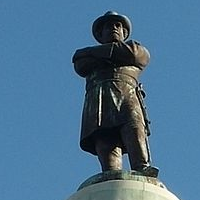New Orleans Fighting to Remove Confederate Symbols From City
 New Orleans' Robert E. Lee monument--Credit: Wikipedia
New Orleans' Robert E. Lee monument--Credit: Wikipedia
By Rebecca Santana, Associated Press
NEW ORLEANS — New Orleans has the right to remove Confederate monuments that are the center of a heated debate, the city’s attorneys told an appeals court Wednesday, but opponents who want a delay said removing them could cause irreparable harm.
Those pushing to keep the monuments got a skeptical reception from the judges, who raised harsh questions about their chances of prevailing.
A three-judge panel of the 5th Circuit Court of Appeals heard arguments on whether the city can remove the four monuments, which have become flashpoints for racial controversy.
“This case is a simple case of whether the city has the power to remove its property,” a lawyer for New Orleans, Adam Swensek, told the judges. “If the City Council can put it up, we can take it down.”
The City Council voted in December 2015 to remove statues of Confederate Gens. Robert E. Lee and P.G.T. Beauregard, Confederate States of America President Jefferson Davis and a monument honoring whites who tried to topple a biracial post-Civil War government in New Orleans. The last monument, called the Liberty Monument, is also subject to a separate federal order dating back to when it was moved during a construction period. Moving it would require further legal proceedings even if the court decides in the city’s favor.
Mayor Mitch Landrieu urged the monuments’ removal after police said a white supremacist who posed for photos with the Confederate battle flag killed nine parishioners inside an African-American church in Charleston, South Carolina, last year.
But their removal has been sharply controversial in this Deep South city where passions over the Civil War still run strong. Opponents call the monuments part of the city’s history and say they should be protected historic structures. Others say they’re offensive artifacts honoring the region’s slave-owning past.
In court Wednesday, a lawyer for the four historical organizations called for the monuments to stay put and urged the court to keep them in place to give a lower court time to review the case in-depth. The groups have argued that moving the monuments could damage them.
“All evidence supports that risk of irreparable harm to these monuments is substantial,” Franklin Jones argued. He said there’s “... no harm whatsoever to the city to let them rest in peace for another year.”
Among the plaintiffs’ arguments: Their constitutional rights were violated by the process for removal; the monuments were protected by historic preservation laws; and by maintaining the monuments over the years they’ve gained recognizable property interest in them and that removing the monuments could irreparably harm them. They’re asking the appeals court to grant an injunction that would remain in effect throughout the litigation, meaning the city couldn’t remove the monuments for months or years.
The court made no decision Wednesday and didn’t indicate when it would rule. But Jones repeatedly came under sharp questioning by the judges about his chance of succeeding on the merits of his case, should the issue go back to a lower court for a fuller hearing. They hammered away at whether his group could be considered to have recognizable property interest in the monuments.
At one point, Judge Patrick E. Higginbotham point-blank questioned whether Jones’s side had a legal theory.
“If you’ve got it, you’ve got it. If you don’t, you don’t,” he said.
A contractor hired to remove the monuments later pulled out of the job, citing death threats and possible loss of business. The city has put the bid process on hold until the court process concludes.
The city went through a lengthy review before deciding whether to remove the statues — sessions often heated with public debate.
Those trying to keep the monuments up appealed to state and federal courts. In federal court, they argued the city shouldn’t be allowed to remove the monuments while the case was still being heard. A federal judge disagreed, allowing the city to go ahead with the removal.
But an appeals court later blocked the city from removing the monuments until the judges could hear the arguments that were presented Wednesday.
The city argues that local governing authority owns and controls the removal of public monuments. They say the four organizations have already had the opportunity to speak repeatedly at the public meetings.
To Learn More:
Presidential Candidate Bobby Jindal Promises to use Nonexistent Law to Protect Confederate Statues (by Noel Brinkerhoff, AllGov)
House Votes to Ban Confederate Flags from Federal Cemeteries and National Park Stores, then Backtracks ... and Backtracks on the Backtrack (by Danny Biederman and Noel Brinkerhoff, AllGov)
House Republicans Block Attempt to Ban Confederate Imagery From Capitol (by Andrew Taylor, Associated Press)
- Top Stories
- Unusual News
- Where is the Money Going?
- Controversies
- U.S. and the World
- Appointments and Resignations
- Latest News
- Trump to Stop Deportations If…
- Trump Denounces World Series
- What If China Invaded the United States?
- Donald Trump Has a Mental Health Problem and It Has a Name
- Trump Goes on Renaming Frenzy






Comments